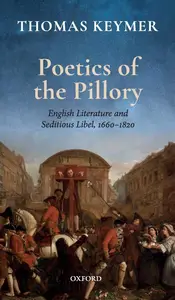- Joined
- Jul 3, 2023
- Messages
- 90,177
- Reaction score
- 1
- Points
- 38

Free Download Poetics of the Pillory: English Literature and Seditious Libel, 1660-1820 (Clarendon Lectures in English) by Thomas Keymer
English | December 24, 2019 | ISBN: 0198744498 | 342 pages | PDF | 3.89 Mb
On the lapse of the Licensing Act in 1695, Thomas Macaulay wrote in his History of England, 'English literature was emancipated, and emancipated for ever, from the control of the government'. It's certainly true that the system of prior restraint enshrined in this Restoration measure was now at an end, at least for print. Yet the same cannot be said of government control, which came to operate instead by means of post-publication retribution, not pre-publication licensing, notably for the common-law offence of seditious libel. For many of the authors affected, from Defoe to Cobbett, this new regime was a greater constraint on expression than the old, not least for its alarming unpredictability, and for the spectacular punishment-the pillory-that was sometimes entailed. Yet we may also see the constraint as an energizing force. Throughout the eighteenth century and into the Romantic period, writers developed and refined ingenious techniques for communicating dissident or otherwise contentious meanings while rendering the meanings deniable.
As a work of both history and criticism, this book traces the rise and fall of seditious libel prosecution, and with it the theatre of the pillory, while arguing that the period's characteristic forms of literary complexity-ambiguity, ellipsis, indirection, irony-may be traced to the persistence of censorship in the post-licensing world. The argument proceeds through case studies of major poets and prose writers including Dryden, Defoe, Pope, Fielding, Johnson, and Southey, and also calls attention to numerous little-known satires and libels across the extended period.
Buy Premium From My Links To Get Resumable Support and Max Speed
Rapidgator
l5b3p.7z.html
TakeFile
l5b3p.7z.html
Fileaxa
Loading…
fileaxa.com
l5b3p.7z.html
Links are Interchangeable - Single Extraction



